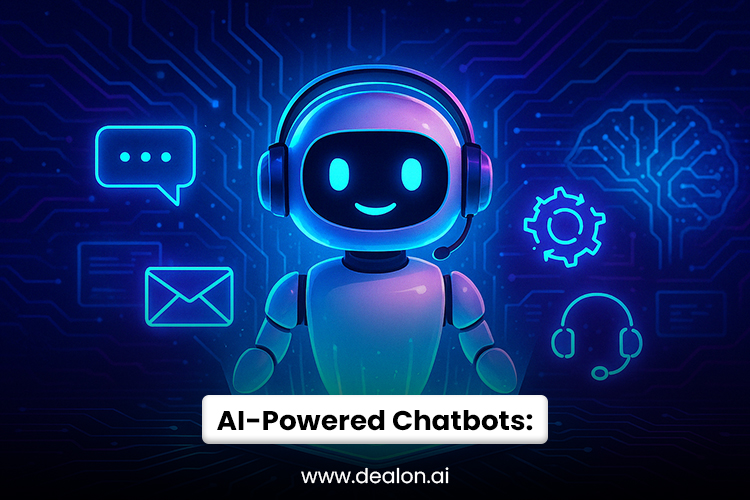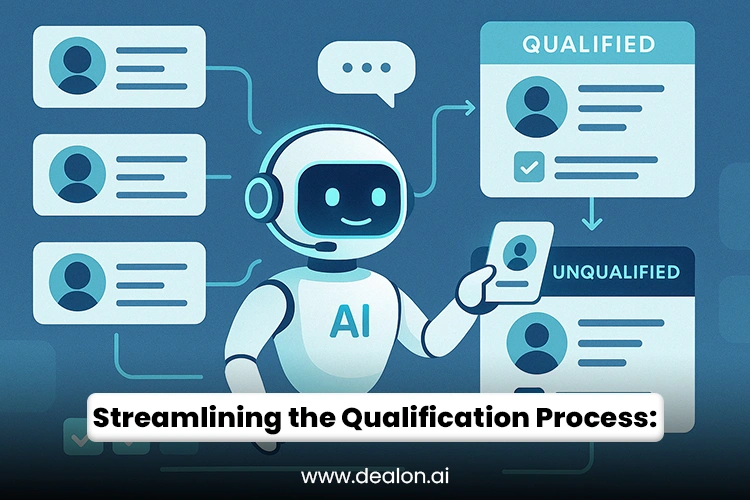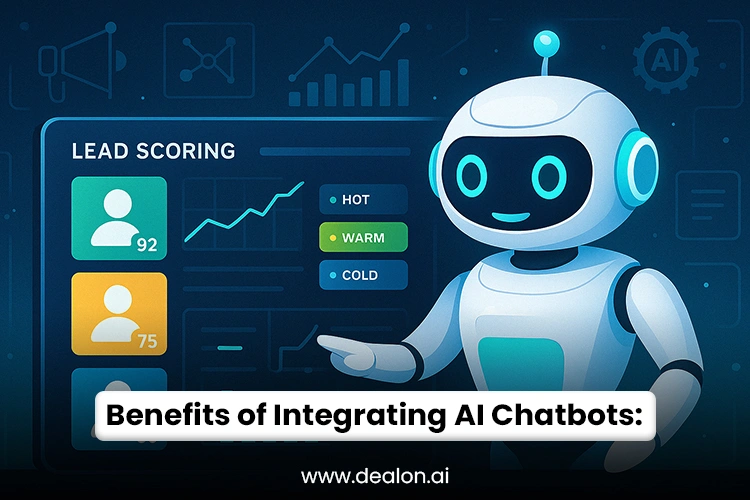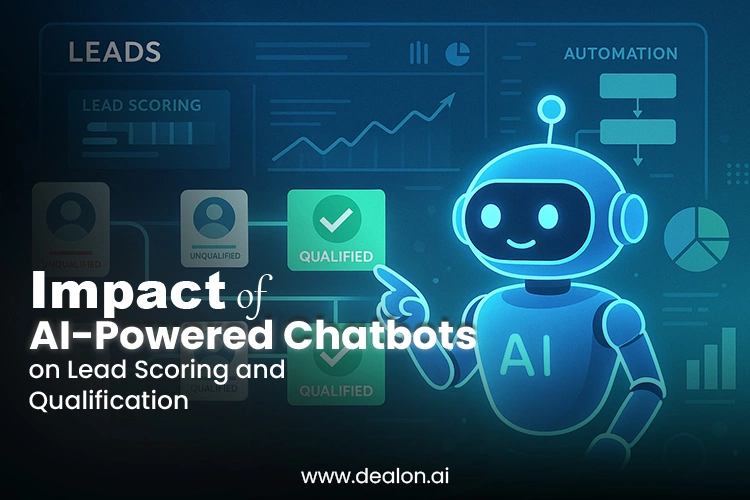In the fast-paced world of digital marketing, where success hinges on agility and precision, AI has become a foundational driver of innovation. Among its myriad applications, AI-powered chatbots are revolutionary tools in transforming lead scoring and qualification methodologies. These sophisticated virtual agents transcend traditional engagement by integrating advanced algorithms and cutting-edge natural language processing (NLP). The result is not merely a conversation but a data-rich interaction that unravels user intent, anticipates needs, and delivers personalized experiences.
What sets AI chatbots apart is their ability to operate at the intersection of efficiency and intelligence. By autonomously gathering, analyzing, and categorizing leads in real-time, they dissolve the silos that often hinder sales and marketing teams. These chatbots don’t just qualify leads; they nurture them, fostering connections beyond surface-level interactions. With the power of machine learning, their accuracy in identifying high-value prospects grows exponentially, ensuring a refined and future-ready lead pipeline.
Also Read: From Data to Dialogue: How AI-Driven Insights Power Smarter Chatbot Interactions In 2025
What Is Lead Scoring and Why Is It Crucial?
Lead scoring is a cornerstone for effective customer acquisition strategies in the highly competitive digital ecosystem. Lead scoring is a structured approach to assessing and prioritizing potential customers based on their probability of becoming paying clients. This methodology enables businesses to identify, prioritize, and engage high-quality prospects, ensuring the optimal allocation of resources and enhancing conversion rates. Lead scoring involves assigning a numerical or categorical value to leads derived from an amalgamation of metrics such as demographic details, behavioral patterns, and engagement history with your brand. For instance:
- Demographics: Does the lead match your ideal customer profile (ICP) regarding industry, job role, or company size?
- Behavioral Data: Has the lead interacted with key assets like whitepapers, email campaigns, or product demos?
- Engagement Metrics: What is the frequency and quality of their interactions with your website or sales representatives?
A robust lead-scoring framework integrates these factors to create a hierarchy of prospects, allowing businesses to concentrate efforts on leads with the highest revenue potential. Effective lead scoring offers transformative benefits, including:
Prioritization of High-Value Leads: Businesses can focus on leads most likely to convert, avoiding wasted effort on low-value prospects.
Efficient Resource Allocation: By distinguishing between hot, warm, and cold leads, teams can channel their energy toward high-priority engagements.
Enhanced Sales and Marketing Synergy: A transparent scoring system bridges the gap between marketing-generated leads and sales follow-ups, fostering alignment and reducing friction.
Challenges in Traditional Lead Scoring
Despite its importance, traditional lead-scoring methods often fall short. They rely heavily on manual processes and are susceptible to human bias, errors, and inefficiencies. Static scoring models may also struggle to adapt to evolving customer behaviors or market dynamics, leading to suboptimal targeting and missed opportunities.
AI-Powered Chatbots: A Revolutionary Approach

This is where AI-powered chatbots redefine the paradigm. These intelligent systems leverage machine learning and real-time data analysis to automate lead scoring. By engaging prospects through personalized, conversational experiences, they gather nuanced insights that traditional systems overlook. Furthermore, chatbots analyze vast datasets without fatigue, continuously refining scoring models and adapting to emerging trends.
AI-powered chatbots have evolved far beyond their initial role as digital assistants, now serving as transformative tools in lead scoring. Operating as the first touchpoint for countless website visitors, these intelligent systems provide uninterrupted customer service and act as sophisticated data aggregators and analysts. By seamlessly integrating with advanced algorithms, AI chatbots dynamically enhance lead-scoring processes, offering businesses unparalleled efficiency and precision.
1. Data Collection and Enrichment
One of the cornerstone functions of AI chatbots is their ability to collect and enrich data in real-time. Through natural language processing (NLP), these chatbots engage in meaningful dialogues with prospects, extracting valuable insights that traditional methods might overlook. Key contributions include:
Behavioral Analytics: Chatbots track user actions, such as time spent on specific pages, interaction with content, and navigation patterns, to gauge interest levels.
Intent Recognition: By analyzing conversational cues, chatbots decipher whether a visitor is casually browsing, seeking specific information, or demonstrating strong purchasing intent.
Demographics and Preferences: With well-crafted questions, chatbots can discreetly acquire information about a prospect’s role, industry, or unique preferences, which is instrumental for personalized marketing strategies.
This robust dataset feeds directly into lead-scoring frameworks, enabling businesses to construct a holistic profile for each prospect and make more informed decisions.
2. Real-Time Qualification
Traditional lead scoring systems often operate on delayed timelines, requiring manual data review and input. AI chatbots, however, revolutionize this by performing real-time lead qualification. By instantly analyzing user behavior and responses, chatbots categorize leads into actionable segments such as “hot,” “warm,” or “cold.”
For example, consider a visitor expressing interest in premium products or services. An AI chatbot can immediately identify the high conversion potential and escalate the lead to a sales representative, significantly reducing response times. This immediacy enhances the likelihood of conversion and guarantees that sales teams concentrate their efforts where they are most impactful.
3. Machine Learning for Enhanced Accuracy
What sets AI-powered chatbots apart is their ability to evolve through machine learning continually. As these systems interact with increasing users, they refine their understanding of behavioral patterns, demographic trends, and conversion triggers. This adaptability ensures that the lead-scoring process becomes progressively more precise, minimizing the risk of undervaluing potential prospects or misclassifying leads.
Streamlining the Qualification Process with AI Chatbots

The lead qualification process is pivotal in sales and marketing strategies, serving as the gateway to identifying prospects who align with the ideal customer profile (ICP) and exhibit a strong potential to convert. Traditionally, this process has been labor-intensive, fraught with inefficiencies, and prone to subjective biases. AI-powered chatbots are revolutionizing lead qualification by automating workflows, personalizing interactions, and ensuring only high-quality leads advance through the sales funnel.
1. Personalizing Interactions
Modern consumers demand tailored, value-driven experiences that resonate with their unique needs and preferences. AI chatbots meet these expectations by leveraging advanced algorithms to analyze behavioral data, purchase history, and conversational context. This capability enables them to craft personalized responses that foster meaningful engagement.
For instance, a chatbot interacting with a prospect who has explored a product’s pricing page multiple times might seamlessly introduce a tailored discount offer or provide detailed information about financing options. These personalized interactions deepen trust and offer critical insights into a lead’s intent and readiness to make a purchasing decision. By capturing nuanced data points, AI chatbots empower businesses to refine their approach and maximize conversion potential.
2. Automating Repetitive Tasks
Repetitive administrative tasks, such as gathering preliminary lead information, answering common inquiries, and scheduling consultations, often create bottlenecks in the sales process. AI chatbots alleviate this burden by automating these time-consuming activities, freeing sales teams to concentrate on high-value leads requiring more nuanced attention.
For example, an AI chatbot can autonomously handle queries about product specifications, compatibility, or shipping timelines while collecting critical data points such as budget, company size, and purchasing authority. This streamlined process reduces the turnaround time for lead qualification, enabling businesses to maintain momentum and focus on nurturing relationships with prospects most likely to convert.
3. Pre-Screening Leads
One of the most transformative applications of AI chatbots lies in their ability to pre-screen leads with precision. By employing predefined criteria—such as geographic location, industry relevance, or decision-making authority—chatbots can efficiently filter out unqualified prospects before they are passed to the sales team.
For instance, a chatbot interacting with a potential lead might identify that their budget falls outside the company’s service thresholds or lacks purchasing authority. By discarding these unqualified leads early, businesses avoid wasting resources and ensure that sales teams engage with only viable opportunities.
The Benefits of Integrating AI Chatbots with Lead Scoring Systems

Integrating AI chatbots with lead-scoring systems is revolutionizing how businesses identify, qualify, and nurture prospects. Companies unlock many benefits beyond mere operational efficiency by merging chatbots’ conversational intelligence with lead-scoring tools’ analytical rigor. This dynamic synergy enhances conversion rates, optimizes costs, ensures scalability, and provides actionable insights that shape future strategies.
1. Increased Conversion Rates
AI chatbots identify high-quality leads by analyzing real-time interactions, behavioral data, and purchase intent. Once identified, these chatbots engage prospects with personalized content, nurturing them precisely through the sales funnel. Unlike traditional methods, which often miss subtle signals of buyer intent, AI chatbots use predictive analytics to recognize readiness to purchase, ensuring timely follow-ups and maximizing conversion potential.
For example, a chatbot that detects strong interest in a premium product might proactively offer a consultation or demonstration, boosting the likelihood of closing the sale. This targeted approach fosters trust and ensures that prospects receive the exact information they need, precisely when they need it.
2. Cost Efficiency
Integrating AI chatbots with lead scoring systems significantly reduces the reliance on manual labor for lead qualification. Tasks that once required extensive human intervention—such as sorting leads, answering FAQs, and scheduling follow-ups—are now handled autonomously. This automation minimizes labor costs and eliminates inefficiencies caused by human error or delays.
Moreover, by pre-screening leads, chatbots prevent resources from being wasted on unqualified prospects, ensuring that sales teams focus their efforts on high-value opportunities. The result is a leaner, more cost-effective sales process that drives superior outcomes.
3. Scalability
One of the most remarkable advantages of AI chatbots is their scalability. Unlike human teams, chatbots can manage thousands of interactions simultaneously without compromising on quality. This makes them particularly valuable for businesses experiencing rapid growth or operating in high-demand markets.
Whether engaging a single visitor or handling an influx of inquiries during a product launch, AI chatbots provide consistent, high-quality interactions that ensure no lead is overlooked. This flexibility enables businesses of any size to guarantee smooth operations, even during periods of high demand.
4. Actionable Insights
The data collected through chatbot interactions feeds directly into lead scoring systems, providing a treasure trove of actionable insights. Businesses can refine their marketing strategies and campaigns by analyzing patterns in customer behavior, preferences, and concerns.
For instance, recurring questions or objections that surfaced during chatbot interactions may indicate areas for product improvement or gaps in customer education. With these insights, businesses can adapt their offerings and messaging to align more closely with customer needs, enhancing long-term success.
Future Trends: AI Chatbots and Predictive Analytics
The evolution of lead scoring is set to be profoundly influenced by the convergence of AI chatbots and predictive analytics. This integration represents a paradigm shift, enabling businesses to transition from reactive strategies to proactive, insight-driven approaches. Powered by AI, predictive analytics leverages vast datasets encompassing historical interactions, market dynamics, and behavioral patterns to forecast lead potential accurately.
AI chatbots are at the forefront of this transformation. Equipped with real-time data-gathering capabilities and machine learning algorithms, these tools can synthesize and interpret complex datasets in seconds. Chatbots can preemptively identify high-value prospects by combining conversational data with predictive models even before explicit interest is demonstrated.
For instance, predictive tools could analyze a lead’s browsing history, past purchases, and engagement levels to determine their likelihood of converting into a loyal customer. Chatbots can then deliver hyper-personalized recommendations or timely incentives, effectively nurturing leads while reducing the sales cycle.
Furthermore, these advancements will empower businesses to identify emerging market opportunities and pivot strategies accordingly. As predictive analytics continues to evolve, the synergy with AI chatbots will redefine lead scoring, ensuring businesses remain agile, competitive, and equipped to meet the demands of an ever-changing digital landscape.
Conclusion
Integrating AI-powered chatbots with lead-scoring systems has revolutionized how businesses identify, qualify, and nurture prospects. These intelligent tools enhance every sales funnel stage, from data collection and real-time lead qualification to personalized engagement and predictive analytics. Chatbots streamline workflows by automating repetitive tasks and leveraging advanced machine learning, allowing sales and marketing teams to focus on high-value opportunities.
AI chatbots bring unparalleled efficiency, scalability, and cost-effectiveness to lead scoring. Their ability to engage thousands of prospects simultaneously, collect rich behavioral insights, and refine scoring algorithms over time ensures that no opportunity is overlooked. The added precision reduces resource wastage and maximizes conversion rates by routing only the most qualified leads to sales representatives.
Looking ahead, the synergy between chatbots and predictive analytics will redefine lead scoring. By analyzing historical data, market trends, and individual behaviors, businesses can forecast lead potential with unprecedented accuracy, tailoring their strategies proactively. This evolution represents a shift from reactive to insight-driven approaches, positioning organizations at the forefront of competitive markets.
In the age of digital transformation, the marriage of AI chatbots and lead scoring is not just a trend—it’s necessary for businesses aiming to stay agile, customer-centric, and thriving in an ever-evolving landscape.

